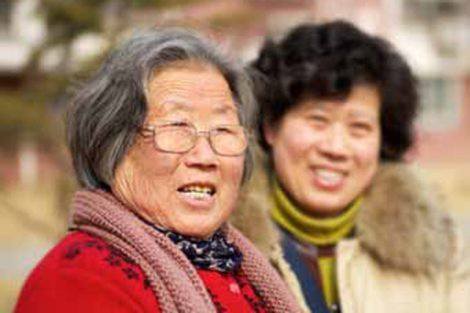[ Spring 2013 ]
Breast cancer is the most common type of malignancy among Chinese women, and it’s on the rise. There were 215,600 new breast cancer diagnoses in China in 2011, a nearly 60 percent increase from just nine years earlier. The median age of Chinese women with breast cancer is 48–roughly 10 years younger than their Western counterparts. And China’s breast cancer mortality has doubled over the past 30 years. Often, breast cancer diagnoses aren’t made until women are already suffering late-stage cancer.
A new $1.7 million grant from Goldman Sachs Gives to Harvard School of Public Health is aimed at reversing these grim trends. As part of Goldman Sachs Gives’ Breast Cancer Education and Awareness Initiative in China, launched in 2011, a faculty team at the School, led by Yuanli Liu, senior lecturer in the Department of Global Health and Population, is developing scientifically sound and culturally sensitive breast cancer awareness and training materials and curricula for the Chinese provinces of Hunan and Sichuan and the Tianjin metropolitan area–that can be replicated and scaled up nationwide. The project will support the All-China Women’s Federation and the Chinese Ministry of Health in their efforts to promote breast cancer awareness and prevention.
“This project provides an incredible opportunity for Harvard faculty from diverse disciplines–health systems, epidemiology, oncology, health communication, and social and behavioral sciences–to come together to design and evaluate an evidence-based model for breast cancer awareness and education in China,” says Vish Viswanath, associate professor of social and behavioral sciences and a co-investigator on the China breast cancer project. “If we develop a successful model, this has the potential to save millions of lives.”
“We’re funding the Harvard School of Public Health because we believe this world-class institution is uniquely positioned to advance the goals of our work already under way in China,” says J. Michael Evans, vice chairman and global head of growth markets at Goldman Sachs. “As one of the most highly regarded institutions in public health with extensive experience in China–and thus attuned to the cultural, social, economic, and political dynamics in the country–we think HSPH can make an immense contribution to our efforts of building evidence-based models for breast cancer awareness and developing the first standardized series of disease education curriculum in China that can be scaled nationwide.”
The new breast cancer initiative builds on the School’s 30-plus years of collaborations with colleagues in China. For example, Liu also leads HSPH efforts in conducting applied research, convening global leaders for high-level policy dialogues and providing leadership education for China’s health-policy makers and senior health executives. HSPH faculty have also helped China tighten air-quality standards and piloted a low-cost health insurance system that now covers more than 90 percent of the country’s rural population, an estimated 600 million people.
Others on the breast cancer project team include Wendy Chen, MPH ’99, assistant professor of medicine and a breast cancer oncologist at Dana-Farber Cancer Institute (DFCI); Shoba Ramanadhan, SD ’08, a research scientist at the DFCI Communication Laboratory; and HSPH associate dean Karen Emmons, who leads the advisory committee for the project.
Photo: iPanda Studio / iStock
